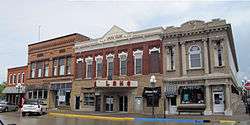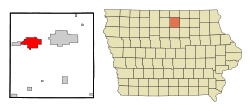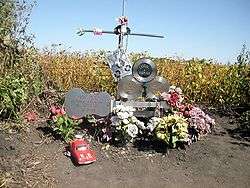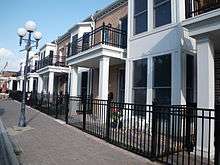Clear Lake, Iowa
Clear Lake is a city in Cerro Gordo County, Iowa, United States. The population was 7,777 at the 2010 census. The city is named for the large lake on which it is located. It is the home of a number of marinas, state parks and tourism-related businesses. Clear Lake is also a major stop on Interstate 35 with many restaurants, hotels and truck stops.
Clear Lake, Iowa | |
|---|---|
City | |
 Historic Downtown Clear Lake | |
 Location of Clear Lake, Iowa | |
| Coordinates: 43°8′11″N 93°22′48″W | |
| Country | US |
| State | |
| County | Cerro Gordo |
| Area | |
| • Total | 13.44 sq mi (34.80 km2) |
| • Land | 10.80 sq mi (27.96 km2) |
| • Water | 2.64 sq mi (6.83 km2) |
| Elevation | 1,237 ft (377 m) |
| Population | |
| • Total | 7,777 |
| • Estimate (2019)[3] | 7,550 |
| • Density | 699.27/sq mi (270.00/km2) |
| Time zone | UTC-6 (Central (CST)) |
| • Summer (DST) | UTC-5 (CDT) |
| ZIP code | 50428 |
| Area code(s) | 641 |
| FIPS code | 19-14025 |
| GNIS feature ID | 0455465 |
| Website | clearlakeiowa |
History
The region around the lake that would later be called Clear Lake was a summer home to the Dakota and Winnebago American Indians. During a land survey of northern Iowa done in 1832 by Nathan Boone, the son of the famous explorer, Daniel Boone, a map was made showing the lake and other bodies of water in the area.[4]
In 1851, Joseph Hewitt and James Dickirson brought their families to camp on the east side of Clear Lake, soon building a cabin, and began a friendship with the Winnebago natives. By 1853, many more white settlers had also came to settle in the area. By the year 1855, the first Clear Lake school was built as well as the first steam saw mill. In that year a hotel was built by James Crow.[4]
By 1870, the town had 775 residents and by 1871 the streets were graded and sidewalks were made of raised boards, sure signs of a thriving new city.[4][5] The city of Clear Lake was incorporated on May 26, 1871.[6] The first bandstand in Clear Lake was built in 1877 at the City Park. The town continued to grow and built its first library in 1889. In 1909, Bayside Amusement park opened for the first time. The first North Iowa Band Festival was organized by John Kopecky, among others, in 1932.[4]
In 1933, the Surf Ballroom opened up on the site of the old Tom Tom ballroom that had been destroyed by fire. The opening dance night saw approximately 700 couples attend. In 1947, the Surf Ballroom burned down; a new Surf Ballroom was built across the street the following year. The Bayside Amusement park closed down in 1958.[4]
The Day the Music Died

In the early hours of February 3, 1959, a Beechcraft Bonanza aircraft carrying Buddy Holly, Ritchie Valens, and The Big Bopper, who had been performing at the Surf Ballroom in Clear Lake, took off from the local runway in nearby Mason City, on its way to the next show in Moorhead, Minnesota.
The plane crashed soon after takeoff, killing everyone aboard. This event was later eulogized by folk singer Don McLean in his famous song, "American Pie", in which the death of these '50s icons serves as a metaphor for greater changes within American society as a whole.
In June 1988, around 600 people gathered to witness the dedication of the monument to the deceased rock and roll legends. Clear Lake also replaced street signs officially changing 2nd Place North to Buddy Holly Place in honor of the late singer.[4]
Geography
Clear Lake is located at 43°8′11″N 93°22′48″W (43.136479, −93.379927).[7]
According to the United States Census Bureau, the city has a total area of 13.44 square miles (34.81 km2), of which 10.80 square miles (27.97 km2) is land and 2.64 square miles (6.84 km2) is water.[8]
Climate
Clear Lake, Iowa has a hot/warm summer humid continental climate (Dfa).
| Climate data for Mason City Municipal Airport | |||||||||||||
|---|---|---|---|---|---|---|---|---|---|---|---|---|---|
| Month | Jan | Feb | Mar | Apr | May | Jun | Jul | Aug | Sep | Oct | Nov | Dec | Year |
| Record high °F (°C) | 62 (17) |
66 (19) |
84 (29) |
93 (34) |
99 (37) |
103 (39) |
104 (40) |
101 (38) |
99 (37) |
95 (35) |
79 (26) |
67 (19) |
104 (40) |
| Average high °F (°C) | 25 (−4) |
29 (−2) |
42 (6) |
58 (14) |
70 (21) |
80 (27) |
83 (28) |
81 (27) |
73 (23) |
60 (16) |
43 (6) |
28 (−2) |
56 (13) |
| Daily mean °F (°C) | 16 (−9) |
21 (−6) |
33 (1) |
47 (8) |
58 (14) |
68 (20) |
72 (22) |
69 (21) |
61 (16) |
48 (9) |
34 (1) |
20 (−7) |
46 (8) |
| Average low °F (°C) | 7 (−14) |
12 (−11) |
24 (−4) |
35 (2) |
47 (8) |
57 (14) |
61 (16) |
58 (14) |
49 (9) |
37 (3) |
24 (−4) |
11 (−12) |
35 (2) |
| Record low °F (°C) | −31 (−35) |
−32 (−36) |
−28 (−33) |
6 (−14) |
22 (−6) |
36 (2) |
42 (6) |
35 (2) |
24 (−4) |
12 (−11) |
−16 (−27) |
−26 (−32) |
−32 (−36) |
| Average precipitation inches (mm) | 0.82 (21) |
1.00 (25) |
2.23 (57) |
3.75 (95) |
4.68 (119) |
5.14 (131) |
4.70 (119) |
4.04 (103) |
3.27 (83) |
2.45 (62) |
1.88 (48) |
1.24 (31) |
35.20 (894) |
| Average snowfall inches (cm) | 10.8 (27) |
7.7 (20) |
6.0 (15) |
2.7 (6.9) |
0.0 (0.0) |
0.0 (0.0) |
0.0 (0.0) |
0.0 (0.0) |
0.0 (0.0) |
0.4 (1.0) |
4.3 (11) |
9.3 (24) |
41.2 (105) |
| Average precipitation days (≥ 0.01 in.) | 7.5 | 7.2 | 9.2 | 11.1 | 12.1 | 11.2 | 9.7 | 9.5 | 8.7 | 8.8 | 8.0 | 8.5 | 111.5 |
| Average snowy days (≥ 0.1 in.) | 6.8 | 5.1 | 3.5 | 1.7 | 0 | 0 | 0 | 0 | 0 | 0.5 | 3.4 | 7.2 | 28.2 |
| Source: National Centers for Environmental Information[9][10] | |||||||||||||
Demographics
| Historical population | |||
|---|---|---|---|
| Census | Pop. | %± | |
| 1870 | 775 | — | |
| 1880 | 1,095 | 41.3% | |
| 1890 | 1,130 | 3.2% | |
| 1900 | 1,706 | 51.0% | |
| 1910 | 2,014 | 18.1% | |
| 1920 | 2,804 | 39.2% | |
| 1930 | 3,066 | 9.3% | |
| 1940 | 3,764 | 22.8% | |
| 1950 | 4,977 | 32.2% | |
| 1960 | 6,158 | 23.7% | |
| 1970 | 6,430 | 4.4% | |
| 1980 | 7,458 | 16.0% | |
| 1990 | 8,183 | 9.7% | |
| 2000 | 8,161 | −0.3% | |
| 2010 | 7,777 | −4.7% | |
| Est. 2019 | 7,550 | [3] | −2.9% |
| Iowa Data Center[5] | |||
Clear Lake is part of the Mason City Micropolitan Statistical Area.
2010 census
As of the census[2] of 2010, there were 7,777 people, 3,507 households, and 2,087 families residing in the city. The population density was 720.1 inhabitants per square mile (278.0/km2). There were 4,423 housing units at an average density of 409.5 per square mile (158.1/km2). The racial makeup of the city was 96.3% White, 0.5% African American, 0.1% Native American, 1.2% Asian, 0.5% from other races, and 1.4% from two or more races. Hispanic or Latino of any race were 2.2% of the population.
There were 3,507 households of which 25.0% had children under the age of 18 living with them, 47.9% were married couples living together, 8.6% had a female householder with no husband present, 3.0% had a male householder with no wife present, and 40.5% were non-families. 35.3% of all households were made up of individuals and 16% had someone living alone who was 65 years of age or older. The average household size was 2.16 and the average family size was 2.78.
The median age in the city was 46.3 years. 20.7% of residents were under the age of 18; 6.2% were between the ages of 18 and 24; 21.2% were from 25 to 44; 31.9% were from 45 to 64; and 20.2% were 65 years of age or older. The gender makeup of the city was 48.2% male and 51.8% female.
2000 census
As of the census[11] of 2000, there were 8,161 people, 3,461 households, and 2,239 families residing in the city. The population density was 782.4 people per square mile (302.1/km2). There were 4,156 housing units at an average density of 398.4 per square mile (153.8/km2). The racial makeup of the city was 96.99% White, 0.27% African American, 0.13% Native American, 0.92% Asian, 0.06% Pacific Islander, 0.75% from other races, and 0.88% from two or more races. Hispanic or Latino of any race were 1.86% of the population.
There were 3,461 households out of which 28.4% had children under the age of 18 living with them, 52.4% were married couples living together, 9.6% had a female householder with no husband present, and 35.3% were non-families. 31.1% of all households were made up of individuals and 12.9% had someone living alone who was 65 years of age or older. The average household size was 2.28 and the average family size was 2.86.
Age spread:23.0% under the age of 18, 7.6% from 18 to 24, 26.7% from 25 to 44, 25.1% from 45 to 64, and 17.7% who were 65 years of age or older. The median age was 41 years. For every 100 females, there were 91.2 males. For every 100 females age 18 and over, there were 87.4 males.
The median income for a household in the city was $35,097, and the median income for a family was $45,589. Males had a median income of $30,266 versus $21,356 for females. The per capita income for the city was $20,213. About 5.0% of families and 7.6% of the population were below the poverty line, including 8.0% of those under age 18 and 5.7% of those age 65 or over.
Arts and culture
- Surf Ballroom: Site of Buddy Holly, Ritchie Valens and The Big Bopper's last concert, the Surf Ballroom continues to host concerts and can be reserved as a convention hall or reception site. It is also a tourist attraction and holds a tribute to the three rock and roll singers each February.
- Lady of the Lake: A sternwheeler ferry boat which takes passengers on a scenic cruise around Clear Lake. It has an enclosed lower level and an open upper level.[12]
- Clear Lake Fire Museum: Designed to resemble an early fire station, this museum's highlights include a 1924 Ahrens-Fox pumper truck, the city's 1883 hand-pulled hose cart, and the original fire bell used by the department. A memorial is dedicated to honor firefighters who have served Clear Lake.[13]
- Guardian Angel Roadside Chapel: Built by Jack Kennedy, the Guardian Angel Chapel overlooks Interstate 35 and is open to the public daily.[13]
- Clear Lake Arts Center: This non-profit organization displays local and regional artists' work along with a sales gallery and art classes open to the public.[13]
- PM Park: Site of the Patriarchs Militant camp (a subgroup of the Independent Order of Odd Fellows). Established in 1914, turned into a historical eating and lodging venue.

Education
There are three schools in the public Clear Lake Community School District. Clear Creek Elementary School hosts preschool,[14] kindergarten, and grades 1–5; Clear Lake Middle School hosts grades 6–8; and Clear Lake High School hosts grades 9–12.[15] Lakeside Alternative, an alternative school program, is run jointly with the Garner–Hayfield–Ventura Community School District in neighboring Ventura, Iowa.[16]
Clear Lake Classical, a preK–8 Classical Christian school,[17] is the only private school in the city.
Infrastructure
Transportation
Clear Lake is located along Interstate 35 approximately halfway between the Twin Cities and Des Moines, Iowa. U.S. Highway 18 runs east–west through the northern side of the city until it meets Interstate 35; at this interchange, Iowa Highway 122 begins and continues to the east. U.S. 18 proper continues to the south, overlapping an approximately 3.5-mile stretch of Interstate 35 and Iowa Highway 27 (part of the Avenue of the Saints). Just south of the city, U.S. 18 and Iowa 27 break from Interstate 35 and continue to the east.[18]
The North Iowa Area Council of Governments operates Region 2 Transit, which provides city and regional demand responsive public bus transit.[19] Jefferson Lines, a private intercity bus service, maintains a stop in Clear Lake with service to locations throughout the Midwest.[20]
Mason City Municipal Airport is located immediately to the east of Clear Lake and provides service to Minneapolis, Chicago, and St. Louis via the regional airline Air Choice One.[21]
Two freight rail lines run through the city. Canadian Pacific Railway operates a line parallel to U.S. 18, which stops at a minor grain facility; trackage rights are given to the Iowa Northern Railway. Progressive Rail maintains the Iowa Traction Railway, a shortline railroad which runs between Clear Lake and Mason City.[22]
Notable people
- Max McGraw (1883–1964), founder of McGraw-Edison and Centel[23]
- Will Kirk Kaynor (1884–1929), United States Representative for Massachusetts[24]
- Carl S. Bates (1884–1956), aviation pioneer and inventor of the Bates Monoplane
- Robert Allan Phillips (1906–1976), Lasker Award-winning physician who developed intravenous fluid replacement treatment for cholera
- Milo Knutson (1917–1981), mayor of La Crosse, Wisconsin and Wisconsin State Senator
- Richie Hayward (1946–2010), founding member for the rock band Little Feat[25]
See also
References
- "2019 U.S. Gazetteer Files". United States Census Bureau. Retrieved July 17, 2020.
- "U.S. Census website". United States Census Bureau. Retrieved May 11, 2012.
- "Population and Housing Unit Estimates". United States Census Bureau. May 24, 2020. Retrieved May 27, 2020.
- "Clear Lake Historical Society". Historical events. Retrieved December 1, 2010.
- "Iowa Data Center" (PDF). Clear Lake. Retrieved December 1, 2010.
- "City Data website". Detailed Profile. Retrieved November 22, 2010.
- "US Gazetteer files: 2010, 2000, and 1990". United States Census Bureau. February 12, 2011. Retrieved April 23, 2011.
- "US Gazetteer files 2010". United States Census Bureau. Archived from the original on June 1, 2012. Retrieved May 11, 2012.
- "Mason City Municipal Airport climate normals". National Centers for Environmental Information. Retrieved September 30, 2019.
- "Mason City Municipal Airport daily GHCN data". National Centers for Environmental Information. Retrieved September 30, 2019.
- "U.S. Census website". United States Census Bureau. Retrieved January 31, 2008.
- Lady of the Lake Cruise
- Attractions Archived June 9, 2007, at the Wayback Machine
- McNett, Jared (April 11, 2019). "New preschool in Clear Lake scheduled to open in Fall 2019". Mason City Globe Gazette. Retrieved September 30, 2019.
- "Schools". Clear Lake Community School District. Retrieved September 30, 2019.
- "Lakeside Alternative". Retrieved September 30, 2019.
- "About". Clear Lake Classical.
- Iowa Department of Transportation. Highway and Street Map of Clear Lake, Iowa (PDF) (Map). Clear Lake Iowa: Iowa Department of Transportation. Retrieved October 6, 2019.
- "Region 2 Transit". Iowa Department of Transportation. Retrieved October 6, 2019.
- Jefferson Lines. "Buses to Iowa". Retrieved October 6, 2019.
- Mason City Municipal Airport. "Home". Retrieved October 6, 2019.
- Iowa Department of Transportation. Iowa Grain Facilities Rail Map (PDF) (Map). Iowa: Iowa Department of Transportation. Retrieved October 6, 2019.
- "Our Founder". McGraw Foundation. Retrieved October 1, 2019.
- "KAYNOR, William Kirk". Biographical Directory of the United States Congress. Retrieved December 1, 2010.
- "Richard Hayward Bio". Little Feat. Retrieved October 1, 2019.
External links
- Official Clear Lake City
- Clear Lake Area Chamber of Commerce
- City Data Comprehensive Statistical Data and more about Clear Lake, Iowa